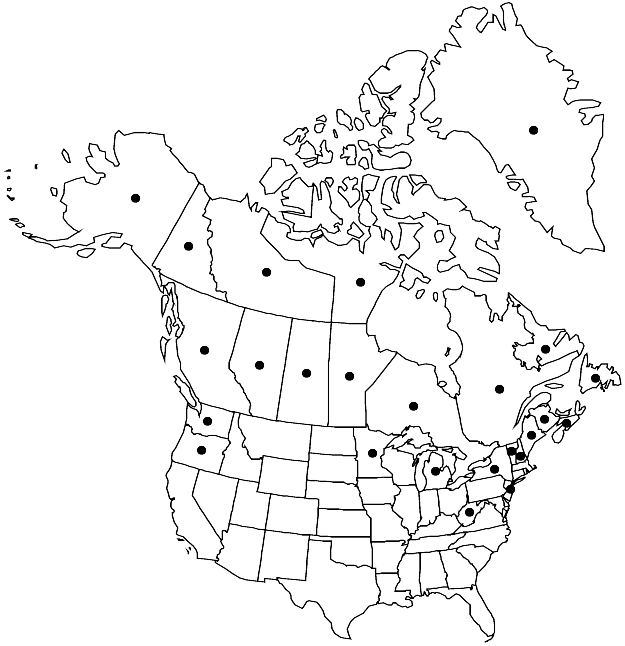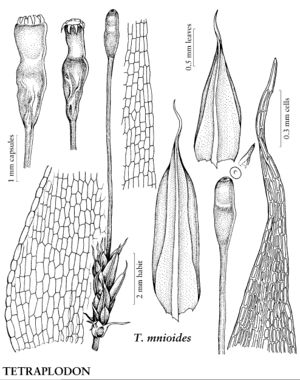Difference between revisions of "Tetraplodon mnioides"
Bryol. Europ. 3: 215. 1844.
FNA>Volume Importer |
FNA>Volume Importer |
||
| Line 30: | Line 30: | ||
|elevation=low to high elevations | |elevation=low to high elevations | ||
|distribution=Greenland;Alta.;B.C.;Man.;N.B.;Nfld. and Labr.;N.W.T.;N.S.;Nunavut;Ont.;Que.;Sask.;Yukon;Alaska;Maine;Mich.;Minn.;N.H.;N.J.;N.Y.;Oreg.;Vt.;Wash.;W.Va.;n Europe;Asia. | |distribution=Greenland;Alta.;B.C.;Man.;N.B.;Nfld. and Labr.;N.W.T.;N.S.;Nunavut;Ont.;Que.;Sask.;Yukon;Alaska;Maine;Mich.;Minn.;N.H.;N.J.;N.Y.;Oreg.;Vt.;Wash.;W.Va.;n Europe;Asia. | ||
| − | |discussion=<p>Tetraplodon mnioides is much more common than other species of the genus and is readily distinguished; the plants differ from those of T. angustatus by their larger tufts and longer sporophytes, which are dark red, becoming black with age. Sterile plants of T. mnioides differ from those of T. angustatus by their oblong-ovate, abruptly subulate leaves with entire margins, whereas those of T. angustatus are oblong-lanceolate, gradually subulate, and serrate. The distal laminal cell walls of T. mnioides are rather thin.</p> | + | |discussion=<p><i>Tetraplodon mnioides</i> is much more common than other species of the genus and is readily distinguished; the plants differ from those of <i>T. angustatus</i> by their larger tufts and longer sporophytes, which are dark red, becoming black with age. Sterile plants of <i>T. mnioides</i> differ from those of <i>T. angustatus</i> by their oblong-ovate, abruptly subulate leaves with entire margins, whereas those of <i>T. angustatus</i> are oblong-lanceolate, gradually subulate, and serrate. The distal laminal cell walls of <i>T. mnioides</i> are rather thin.</p> |
|tables= | |tables= | ||
|references= | |references= | ||
| Line 54: | Line 54: | ||
|publication year=1844 | |publication year=1844 | ||
|special status=Selected by author to be illustrated | |special status=Selected by author to be illustrated | ||
| − | |source xml=https://jpend@bitbucket.org/aafc-mbb/fna-data-curation.git/src/ | + | |source xml=https://jpend@bitbucket.org/aafc-mbb/fna-data-curation.git/src/8f726806613d60c220dc4493de13607dd3150896/coarse_grained_fna_xml/V28/V28_16.xml |
|genus=Tetraplodon | |genus=Tetraplodon | ||
|species=Tetraplodon mnioides | |species=Tetraplodon mnioides | ||
Revision as of 18:03, 18 September 2019
Plants 1–4(–8) cm, light green or yellow-green. Leaves oblong-ovate, concave, 1–2 × 3–5 mm; margins entire; apex abruptly subulate; costa vanishing in subula; distal laminal cells rectangular to oblong-hexagonal, 20 × 35 µm. Sexual condition autoicous. Seta stramineous, usually dark red with age, 1–5 cm. Capsule not cleistocarpous, red, dark or black with age, long-ovate; hypophysis somewhat wider than urn distally; stomata over whole of hypophysis; operculum bluntly conic. Calyptra conic-mitrate. Spores 9–12 µm, smooth or slightly papillose.
Phenology: Capsules mature summer.
Habitat: Dung of carnivores, old bones, owl pellets, dry alpine, boreal, arctic habitats
Elevation: low to high elevations
Distribution

Greenland, Alta., B.C., Man., N.B., Nfld. and Labr., N.W.T., N.S., Nunavut, Ont., Que., Sask., Yukon, Alaska, Maine, Mich., Minn., N.H., N.J., N.Y., Oreg., Vt., Wash., W.Va., n Europe, Asia.
Discussion
Tetraplodon mnioides is much more common than other species of the genus and is readily distinguished; the plants differ from those of T. angustatus by their larger tufts and longer sporophytes, which are dark red, becoming black with age. Sterile plants of T. mnioides differ from those of T. angustatus by their oblong-ovate, abruptly subulate leaves with entire margins, whereas those of T. angustatus are oblong-lanceolate, gradually subulate, and serrate. The distal laminal cell walls of T. mnioides are rather thin.
Selected References
None.
